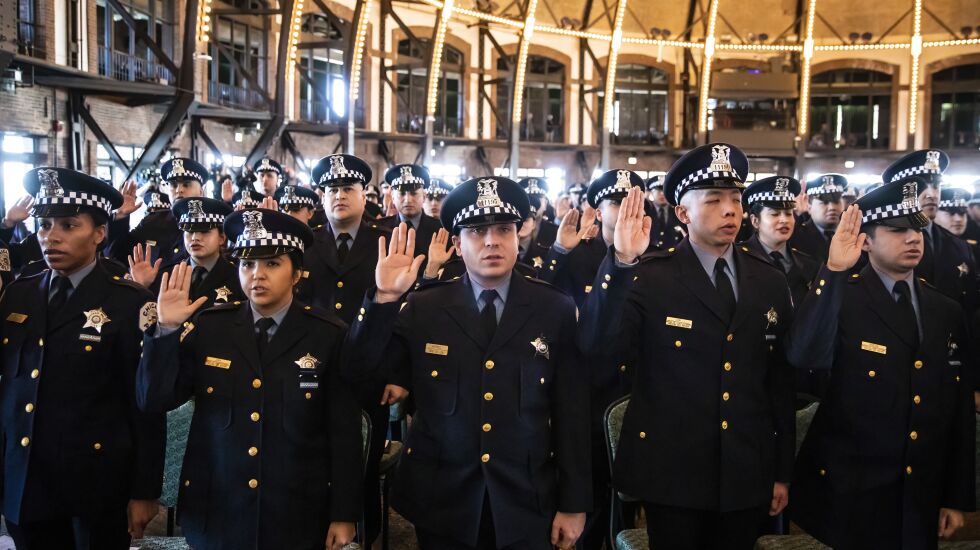
When groups of Chicago police officers took an eight-hour training course on updated de-escalation and use-of-force policies, they did what comes naturally to anyone who is asked to sit in class after working for 15 days in a row or completing a night shift: They fell asleep.
Meanwhile, the officers who were wide awake and paying attention didn’t exactly get a fresh perspective. The sessions ultimately reinforced an age-old “us-vs-them” mindset that hampers any possibility of goodwill between officers and the people they serve, according to a newly-released report from community representatives on Chicago’s Use-of-Force Working Group.
Although Chicago Police Department policies may have improved, the “us against them” mindset values an officer’s life more than a citizen’s and wrongfully casts residents as potential threats, last week’s 24-page report concluded. The working group was convened after the federal consent decree in 2019 ordered the CPD to implement sweeping reforms.
The findings illustrate why CPD’s culture remains stagnant, despite endless talk of reform. In fact, what message does it send when officers are made to take an important training course when they can’t keep their eyes open? That in itself shows a lack of commitment to change, a “check the box off” attitude on the part of CPD.
Plus, per the report, there’s denial that problems even exist, as the design of the course omits any acknowledgment of racism, bias and abuse in the city’s policing.
If the next mayor is serious about curbing crime, he — and the commission that will submit candidates — must put reform at the forefront so that police and the community become partners, not antagonists.
Skills, will, fearlessness
The next police superintendent has to have the skills and most importantly, the will to lead a sweeping transformation of CPD, not just tout it. He or she needs the blessing of, and the mandate from, the mayor and city leaders to do whatever it takes to fully implement the consent decree.
If the superintendent shows only a half-hearted interest, rank-and-file officers will be just as dismissive. Trust between the police and the community, especially Black and Brown residents, will further erode. It is that simple.
For reform to take hold, the next superintendent should stick around for eight to 10 years, former Chicago Interim Police Supt. Charlie Beck told us recently in an Editorial Board meeting.
But a long tenure isn’t essential, as long as subsequent superintendents keep “rowing in the same direction,” said Craig B. Futterman, a founder and director of the University of Chicago Law School’s Civil Rights and Police Accountability Project and a member of the use-of-force working group.
The city “needs someone who is unafraid to challenge” the culture of the CPD, added Futterman. Once that hurdle is cleared, the new superintendent can roll up his or her sleeves and do the following:
• Build a working relationship with the Fraternal Order of Police. It may sound impossible, or even anathema to FOP critics. But common ground and understanding are crucial to changing the DNA of a police department, Beck said.
• In a similar vein, support officers. The way the superintendent treats officers is the way they will treat the public, Beck told us. So if they are treated in a “dictatorial fashion” or “led by the nose,” it will filter down to officers’ interactions with residents.
• Thoroughly investigate officers accused of misconduct and hold them accountable when there is clear evidence of wrongdoing. As Chicago has seen time and again, CPD’s internal affairs department has failed to adequately investigate officers accused of being affiliated with far-right groups. Attitudes can change quickly if officers see their colleagues face serious repercussions for wrongdoing, like losing their jobs, Futterman said. Deterring misconduct would also help keep Chicago from continuing to shell out tens of millions each year to settle civilian lawsuits.
• Make sure that the key post of director of constitutional policing has the resources to oversee court-mandated reforms. When Robert Boik, who initially held the job under Brown, criticized Brown’s decision to transfer officers under Boik’s supervision, he was fired.
• Reorganize CPD to be community-based, not specialist-based. Focusing too much on specialized units depletes police district staffing and ultimately leads to canceled days off and low morale, Beck pointed out. Focusing on community would help curb crime, too: At a Sun-Times community listening session in Rogers Park last week, a longtime resident noted that there was a time he knew the name of his beat cop. Neighborhoods would be safer with that sense of familiarity, along with increased foot patrols, he said.
• Immediately institute a staffing survey to determine how officers are being utilized. A survey was started with the help of the U. of C.’s Crime Lab, and was supposed to be finished last year, Boik told us. Enough with the foot-dragging. Get it done.
• Ensure funding for reform. New equipment, effective training, updated data systems and more will cost money. Change is not cheap.
Chicago has so far measured progress on reform in inches. The next mayor must do better.
We welcome letters to the editor and op-eds. Check out our guidelines for both.
Send letters to letters@suntimes.com







